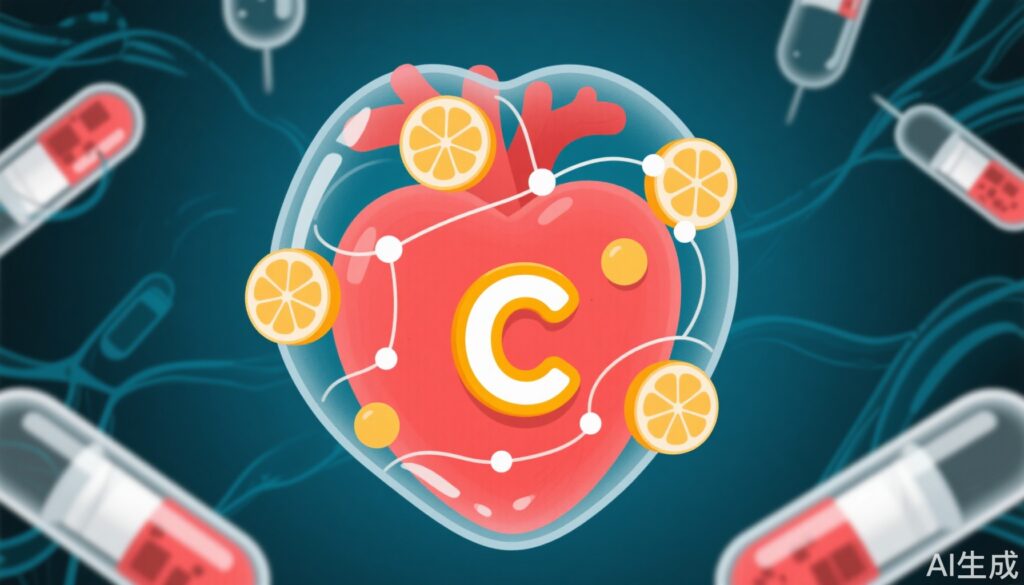Introduction
Doxorubicin is a widely used and highly effective chemotherapeutic agent for treating various cancers. Despite its efficacy, its clinical use is significantly hampered by dose-dependent cardiotoxicity, which can lead to severe cardiac dysfunction and limits its therapeutic potential. This cardiotoxicity poses a major challenge in oncology, necessitating strategies to protect cardiac tissue without compromising anticancer effects.
The Role of Oxidative Stress in Doxorubicin-Induced Cardiotoxicity
Doxorubicin’s cardiotoxic effects are largely attributed to the generation of reactive oxygen species (ROS) and reactive nitrogen species (RNS), which lead to oxidative and nitrosative stress in myocardial cells. This stress damages cellular components including lipids, proteins, and DNA, ultimately impairing mitochondrial function and triggering inflammatory pathways. These molecular events result in cardiomyocyte apoptosis and structural deterioration of the heart muscle.
Vitamin C as an Antioxidant and Cardioprotective Agent
Vitamin C (ascorbic acid) is a potent antioxidant known to neutralize ROS and RNS, thereby reducing oxidative stress. Preclinical studies consistently demonstrate that vitamin C supplementation can preserve mitochondrial integrity, decrease proinflammatory cytokines, and maintain the structural integrity of cardiomyocytes exposed to doxorubicin. Animal models show that vitamin C administration helps sustain cardiac function and reduces myocardial injury markers, suggesting its potential as an adjunct therapy to mitigate cardiac damage during chemotherapy.
Clinical Evidence and Challenges
Clinical data on vitamin C’s cardioprotective effects remain mixed but promising. Some studies report that vitamin C is a safe adjunct that helps preserve cardiac function in patients undergoing anthracycline therapy, including doxorubicin. However, variability in dosing regimens, timing, and administration routes complicates interpretation. There is a critical need for well-designed clinical trials to establish optimal treatment protocols and to better understand the molecular mechanisms underpinning vitamin C’s protective effects in humans.
Molecular Mechanisms Underlying Cardioprotection
Key molecular mechanisms emphasized in this review include the reduction of oxidative and nitrosative stress, protection against mitochondrial dysfunction, and modulation of inflammatory signaling pathways within the myocardium. Vitamin C’s ability to scavenge free radicals and suppress inflammatory cytokines may prevent cardiomyocyte death and preserve myocardial viability. These mechanisms collectively contribute to its cardioprotective profile.
Future Directions
Optimizing vitamin C therapy involves determining the most effective doses, timing relative to chemotherapy cycles, and delivery methods to maximize bioavailability and efficacy. Further research should also explore combination therapies pairing vitamin C with other cardioprotective agents. Understanding the precise molecular interactions will aid in developing targeted interventions to safeguard cardiac health in cancer patients.
Conclusion
Vitamin C shows significant potential as a cardioprotective agent against doxorubicin-induced cardiotoxicity by attenuating oxidative damage, preserving mitochondrial function, and modulating inflammatory responses. While preclinical results are encouraging, further clinical validation is essential to translate these findings into routine oncologic care. With optimized administration, vitamin C could become a valuable adjunct in protecting heart health during chemotherapy.
References
Nsairat H, Lafi Z, Abualsoud BM, Al-Najjar BO, Al-Samydai A, Oriquat GA, Alshaer W, Alqader Ibrahim A, Dellinger AL. Vitamin C as a Cardioprotective Agent Against Doxorubicin-Induced Cardiotoxicity. J Am Heart Assoc. 2025 Aug 6:e042534. doi: 10.1161/JAHA.125.042534. Epub ahead of print. PMID: 40767287.



